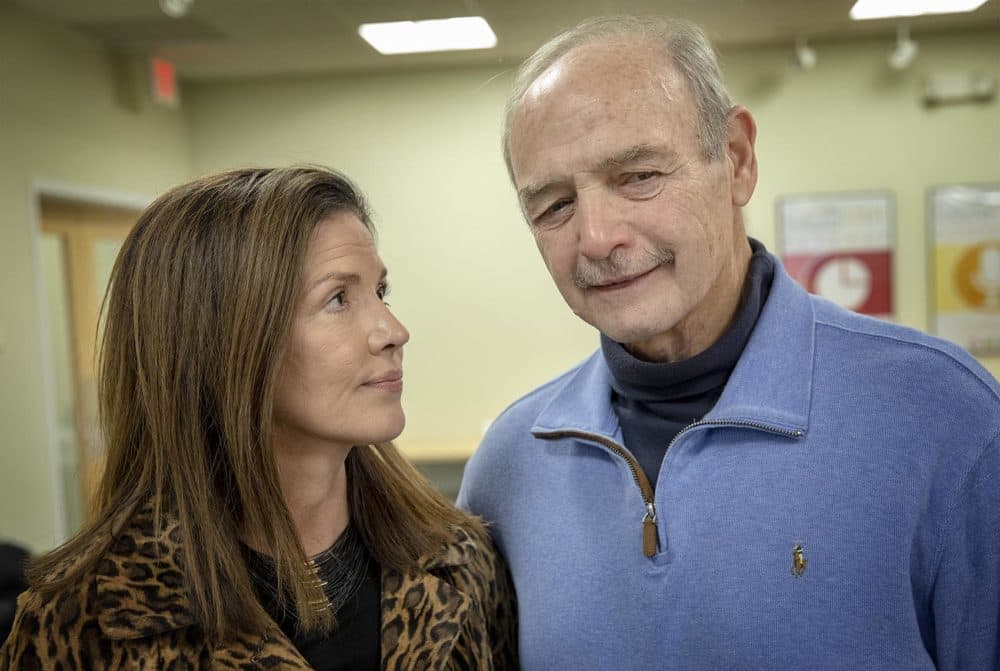Advertisement
Now Released, DiMasi Talks About 'Inhumane' Treatment In Prison
Resume
Former Massachusetts House Speaker Sal DiMasi says his time in prison has turned him into an advocate for those behind bars — especially those who are sick.
In 2011, DiMasi was convicted of corruption charges and sentenced to eight years in federal prison. After a cancer diagnosis, he was granted "compassionate" early release in 2016.
DiMasi knows he's fortunate — it's estimated that less than 10 percent of those who request compassionate release, or medical parole, are actually set free. He largely credits his wife, Debbie DiMasi, who is now working with him to speak out against what they say is the mistreatment of those who are incarcerated.
In a statement, the Federal Bureau of Prisons (BOP) says it provides medical services to all inmates in a manner consistent with accepted community standards for a correctional environment.
Sal and Debbie DiMasi spoke about their prison experience with WBUR.
Interview Highlights
On his cancer diagnosis while in prison:
Sal DiMasi: Well, I arrived in Lexington, Kentucky, on Nov. 30 in 2011, and within three or four weeks, I noticed a lump in my neck that was growing, and they diagnosed it as fourth stage cancer.
Debbie DiMasi: I was petrified for him. I had seen the kind of care that he — or lack thereof, quite frankly.
SD: You don't get good treatment in the Federal Bureau of Prisons.
On trying to complain to the prison medical officials:
DD: No one would answer my phone calls.
SD: I would constantly ask them about my care and what the plan was. I would constantly ask them why — you know, here I am, I've got pneumonia and I'm weak, and I'm going through chemo and radiation. A matter of fact, I got pneumonia three times. At just at that point in time, I thought this was the end for me because in the unit I was in there was about 200 cancer patients and somebody died every other day. They were dropping in the hallways, they were dying in their beds. They were — it was just disgusting the way they were ignored. I didn't understand where I was, I didn't understand what country I was in. I didn't understand how you could be so cruel — cruel and inhumane treatment. I had to get up every day and I had to say, "One day at a time. Just get through this one day. Just fight this for one more day and you'll survive." It was a fight for my life. It was the scariest fight I've ever been in.
DD: It was incredibly difficult. I would try and stay positive for him, but I was livid.
On being former House speaker and being granted compassionate release:
SD: Well, what I would say is basically what I received was deserving under the rules, the regulation, and under the laws.
The problem is that when you try to get the BOP or the Justice Department to process for other people — which I did, I helped them write their requests. It's disgusting the way they refused them on such flimsy things and they try to obfuscate the whole process. When I got compassionate release, you'd think some of the other ones would say, "Well, I didn't get it because you were... " Many of them said, "I'm glad you did, because you have a voice. Don't forget us."
On his incarceration:
SD: Well, I tried to put all of that behind me because I've gone through all of this. And I can speak in generalities, and the generality is that I believe that the criminal justice system is broken because we have mass incarceration now. If you think my case was an extraordinary case of where you should be sending people to prison for that long a period of time — there were dozens and dozens and dozens, hundreds, thousands of cases worse than my case.
On his recent visit to the State House and his legacy:
SD: I was anxious a little going back. It was such a long time. I did an awful lot of work over the years. And basically, I don't think it's been forgotten because, you know, my saying was that, you know, "You could try and taint the good-deed doer, but you can't taint the good deed, and the good deeds will always survive." And that will be my legacy. But my legacy's not over. I think I can help these people that are suffering in prison, and we can have more compassionate release, that we can have more compassion in the system. So I can still be productive I think.
With digital production by WBUR's Dianna Bell
This segment aired on December 17, 2018.
